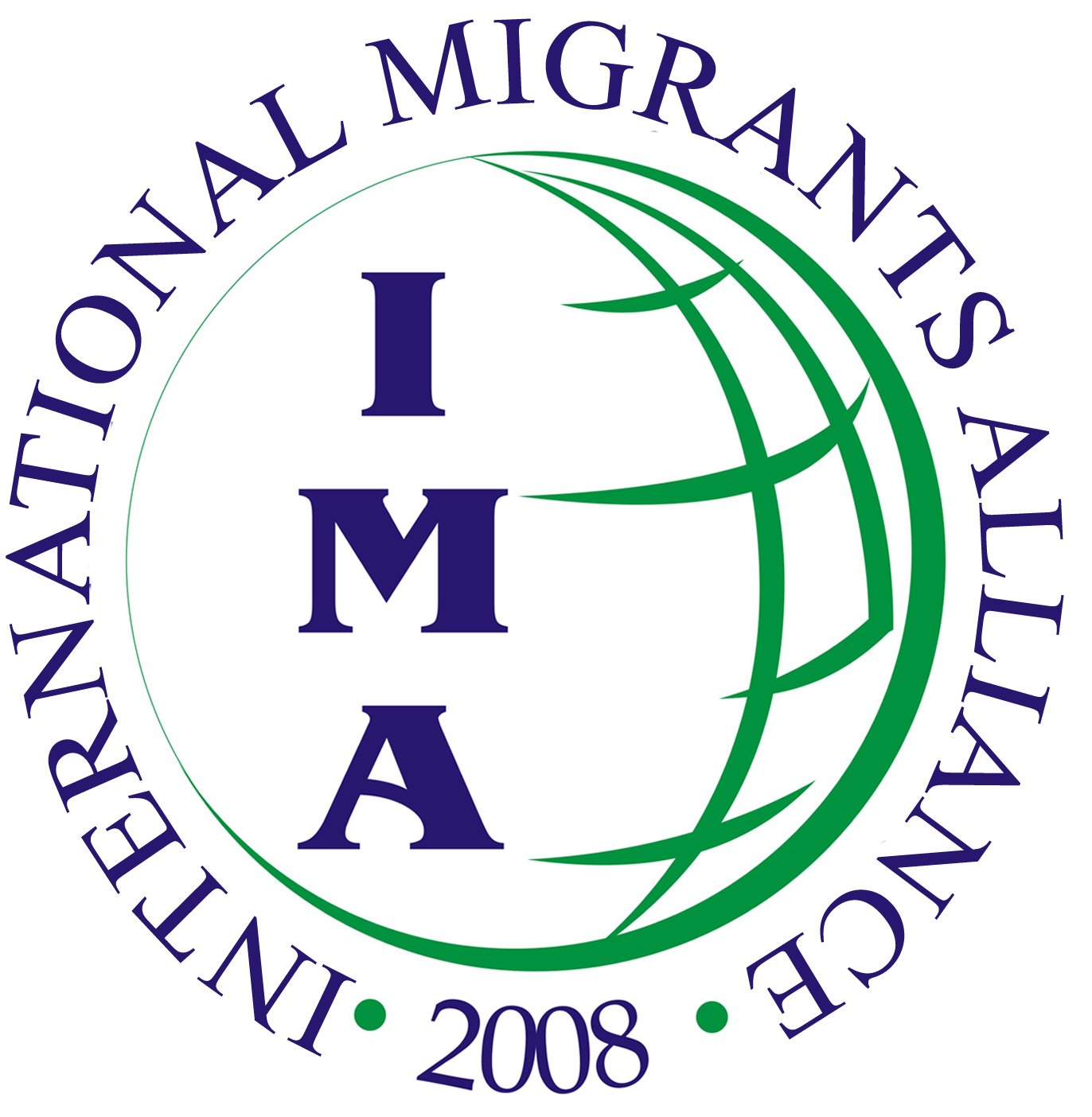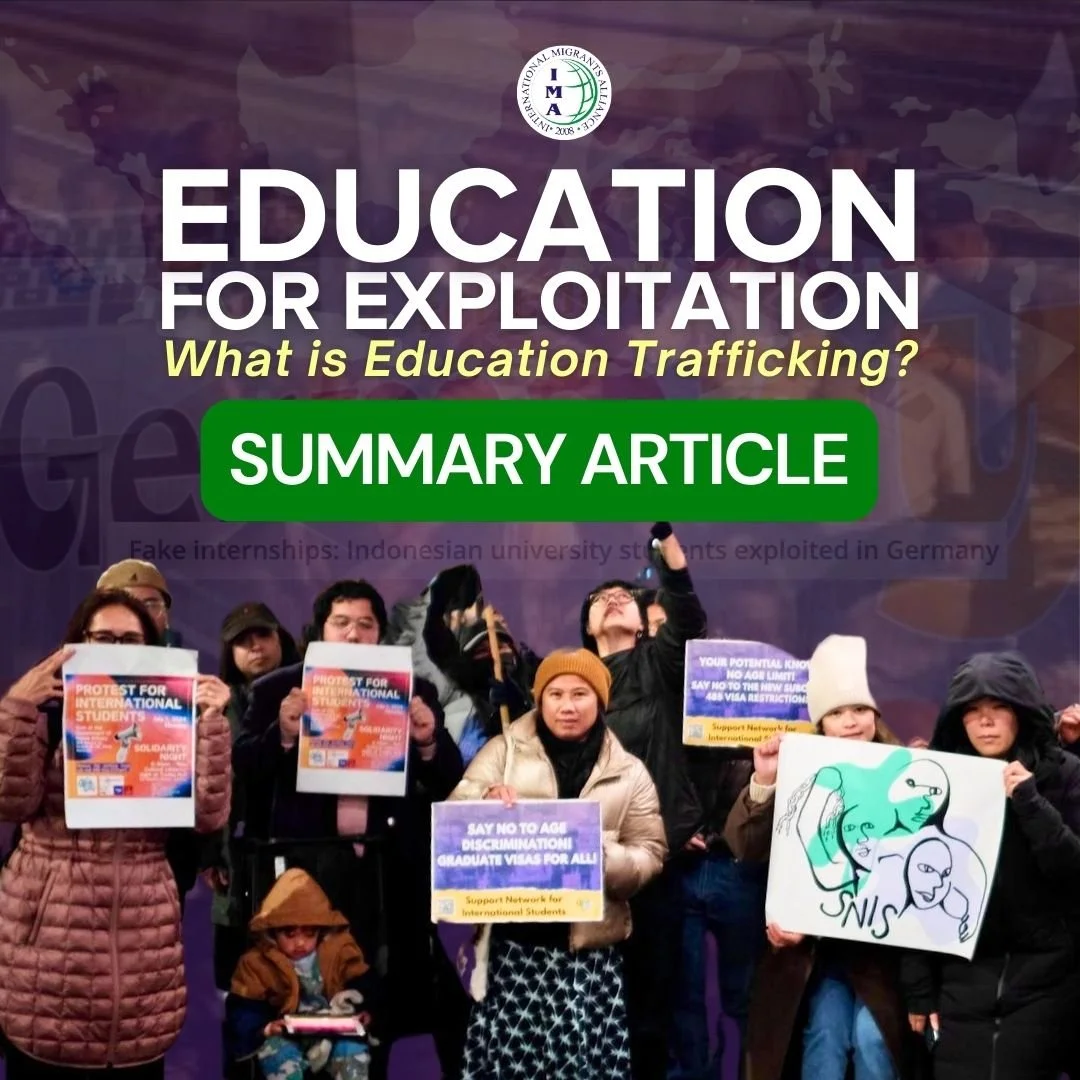[ARTICLE] Education for Exploitation: What is Education trafficking?
IMA Global Forum
17/18 Dec 2024
Summary article
As part of IMA’s “9 Days of Migrant and Refugee Activism” between 10-18 December 2024, the IMA Global—with co-organisers IMA Canada, Beranda Migran (Indonesia), Union Network of Migrants (UNEMIG - Aotearoa/New Zealand) and Support Network for International Students (SNIS - Australia)—held an online forum on the emerging issue of education trafficking, which is affecting migrants globally. The forum was attended by over 50 participants from various countries, and had live Spanish and Bahasa Indonesia interpretation.
The forum was opened by IMA Executive Committee member Terry Valen from IMA USA, who stressed the urgent need to address this emerging form of trafficking to all migrants, especially the youth, and warn them of the dangers of falling victim to education trafficking. Labour migration has been deeply integrated and connected with the education system of sending countries. The governments and education policies of sending countries serve multinational corporations, businesses, and host countries’ labour needs. International students are being recruited as cheap labor for various industries without any legal protection in the host countries. The objectives of this forum were to understand what education trafficking means in different countries and contexts, and the calls to action from the victimised students.
Haninda Kristy from Beranda Migran highlighted the trend of Indonesian youth and students falling victim to education trafficking schemes in Germany. Indonesian students are lured into Germany to become cheap labour using advertisements and the promotion of Germany-oriented study courses in Indonesian schools. Universities promote internship programs to students and help with the pre-departure process, to make the students believe that it is a valid program for them to gain experience in Germany.
The reality is, students are tied to recruitment agencies in Germany and work mostly as manual labourers. These jobs are irrelevant to what students are supposed to study through the education internship program. Universities work together with the recruitment agencies, and these programs promote legalised trafficking to trap the students into debt. Students pay for their own flight and accommodation in Germany, which forces them to work long, irregular hours with below minimum wage to repay their debts. The Indonesian government and universities are perpetuating the commodification of students as ready-made workers who are vulnerable to exploitation. The working internship status is used by agencies in Indonesia and Germany to avoid giving rights and other legal obligations that apply to workers in Germany.
Students are prone to be trapped in education trafficking due to the increasing education costs in Indonesia. Education facilities are now managed by private sectors, and it has become an industry of cheap labour producers. Other countries such as Japan, Taiwan and Thailand are also targeting Indonesian students to become cheap labourers with no rights. Education has become a tool for governments to produce cheap labour to fulfill the emerging demands of the global labour market.
Mandeep Bela from UNEMIG shared the impacts of education trafficking in the receiving country of Aotearoa/New Zealand. The New Zealand government promotes education as a 4 billion dollar industry. International students are treated as commodities and a means of lifting the New Zealand economy. Students are scammed into studying low level qualification courses that many businesses don’t recognise, and therefore are useless.
Students are lured by advertisements on social media platforms and billboards, promoting education as an opportunity to live and settle in New Zealand. The reality is, many cannot find work, and education agents charge hefty fees through education providers. Students are money-making machines for agents, schools and the governments of destination countries. Employers of international students often have contacts with private colleges as well to supply migrants to their businesses. Students are paid below minimum wage, work long hours and are charged fees by their employers to give them jobs. Common cases of exploitation includes verbal, physical and sexual abuse, racial discrimination and modern day slavery. The impact it has on migrants is depression, poverty, drugs and alcohol addiction, gambling, suicides and other health related issues.
Through UNEMIG’s “Stop Education Trafficking” campaign, they have managed to make progressive changes in the immigration system. Protests outside immigration headquarters helped students have their visa fees and course fees waived for them, and policy changes were announced to address exploitation of student migrants. UNEMIG continues to push for the regulation of offshore education agents who mislead international students, remove visa restrictions, and bigger penalties for employers who prey on vulnerable migrants.
Candice Rabusa from SNIS shared the historical context of the Australian education system that created the conditions for education trafficking. International education is a 47.8 billion dollar industry in Australia, and is the 4th export of the country. Most international students in Australia come from the global South, and many of these students are from the middle class in their home countries. In the case of students from the Philippines, the major push factor is the labour export program, apart from the lack of opportunities in the Philippines.
Most international students attend private education institutions or private providers, which exposes them to fraudulent providers. Higher education in Australia is also highly corporatised, with high rates of casual staff and disproportionately higher salaries of Chancellors and Vice Chancellors. There are around 4,000 registered training providers in Australia, and 3,700 of them are private providers that focus on attracting international students for revenue rather than delivering quality education. International education has become a for-profit commodity, and employers exploit the students' reliance on maintaining a valid visa.
SNIS launched the ‘Scrap the Cap’ campaign in 2022 to address the exploitation of international students. They also have social media campaigns, partner with other institutions, and hold protests to call for policies that prevent migrant exploitation. Education trafficking happens because education is treated as a business, and international students in Australia are treated as dispensable. There is more organising to be done, and SNIS will keep pushing for international students rights and fight for their welfare.
Christopher Sorio of Migrante Canada shared the situation of international students in Canada, as the country increasingly relies on international students as a major source of revenue for its education system and economy. Their situation is similar to students in New Zealand and Australia, and has also drawn comparisons to human trafficking due to the systemic exploitation, false promises, and significant vulnerabilities faced by the students.
Students have increasingly voiced concern about the challenges they face and outlined demands to improve their situations; among them are the lowering of tuition fees, better housing support, increased work opportunities and protection with simplified pathways to permanent residency. Students also demand a licensing and monitoring system for education agents, and to hold colleges and universities accountable for the quality of education they provide. They also call for protection from exploitation in the housing and job market.
International students in Canada contribute significantly to the economy and cultural diversity. However, addressing their demands is essential to ensure their well-being and prevent exploitation. Solutions will require collaboration between governments, educational institutions, employers and community organisations such as Migrante, IMA, and international students networks. Moreover, unless there are genuine jobs and industrialisation in sending countries such as the Philippines, people will be forced to leave their countries and find a better life through migration.
The forum was closed by IMA Chairperson Eni Lestari, who warned of the dangers of youth and children being programmed to serve monopoly capitalism through education trafficking, and are now under the threat of forced migration. The IMA is studying the mechanisms within education systems which are built for the purpose of labour migration, and is committed to organising migrant students. The IMA calls on migrant students and activists to join IMA in serving the community of international students, and to promote genuine education which is for the progressive development of our home countries.

